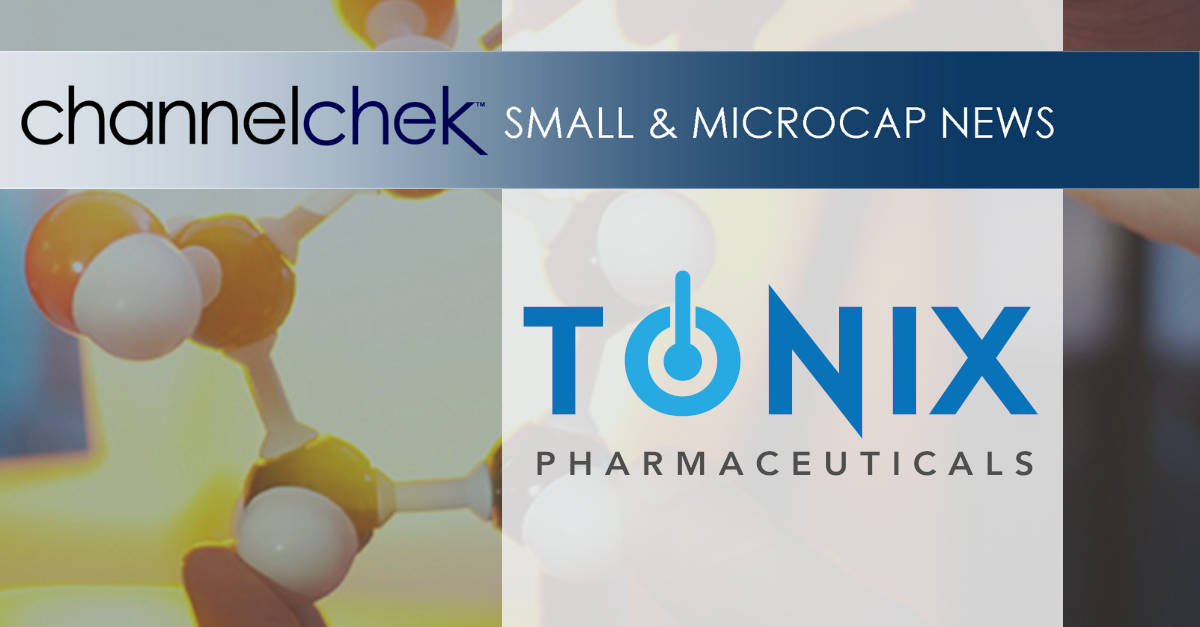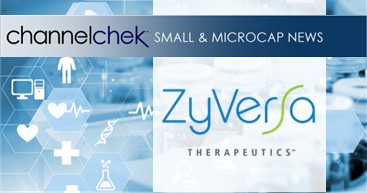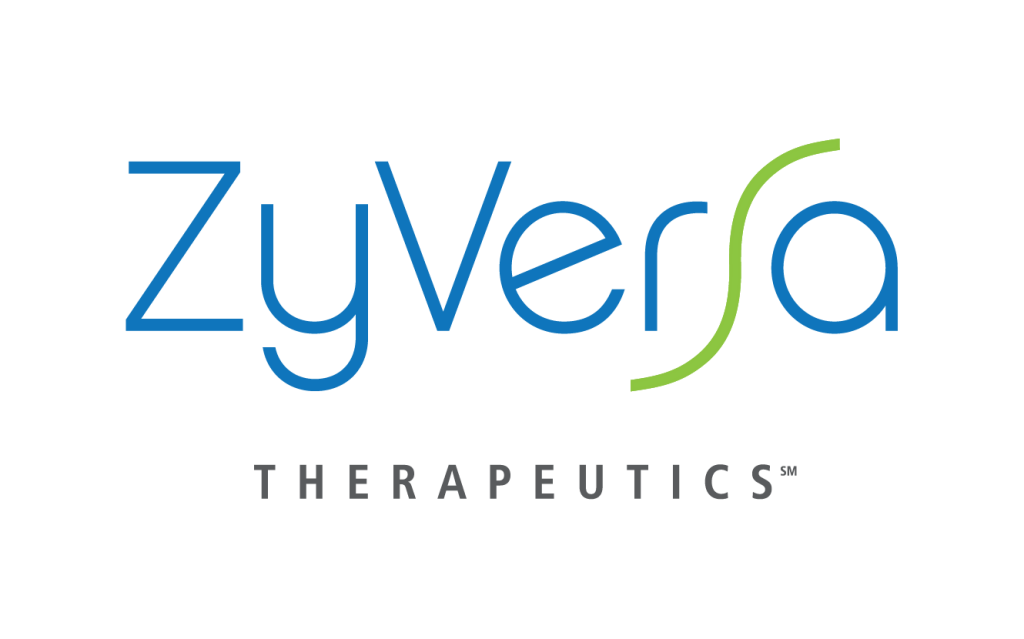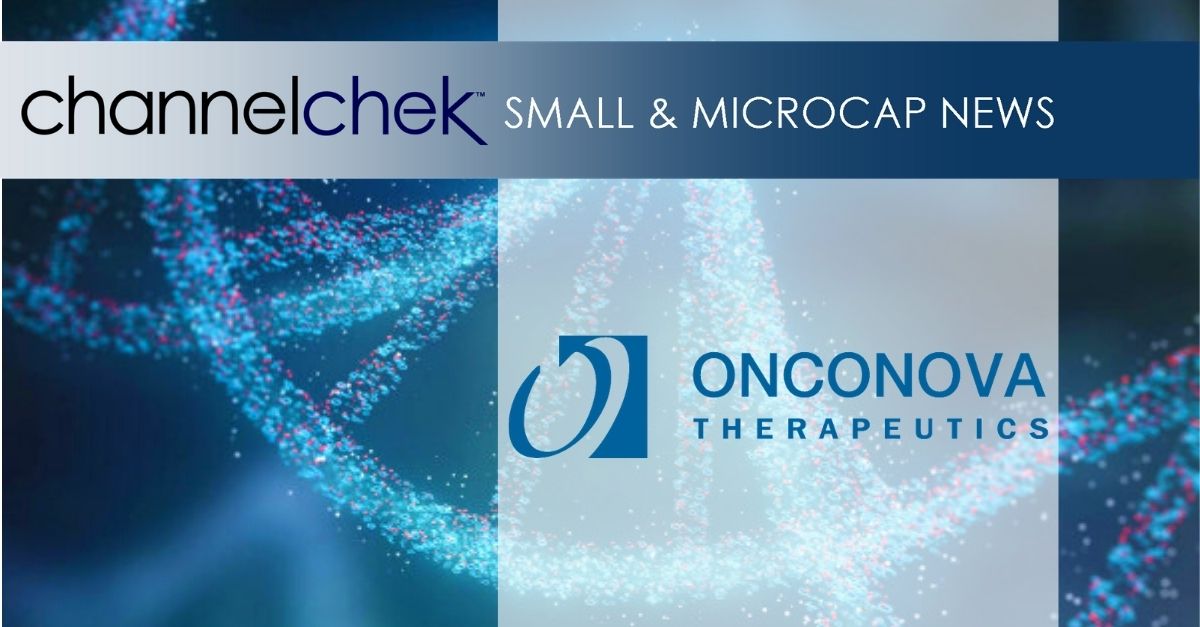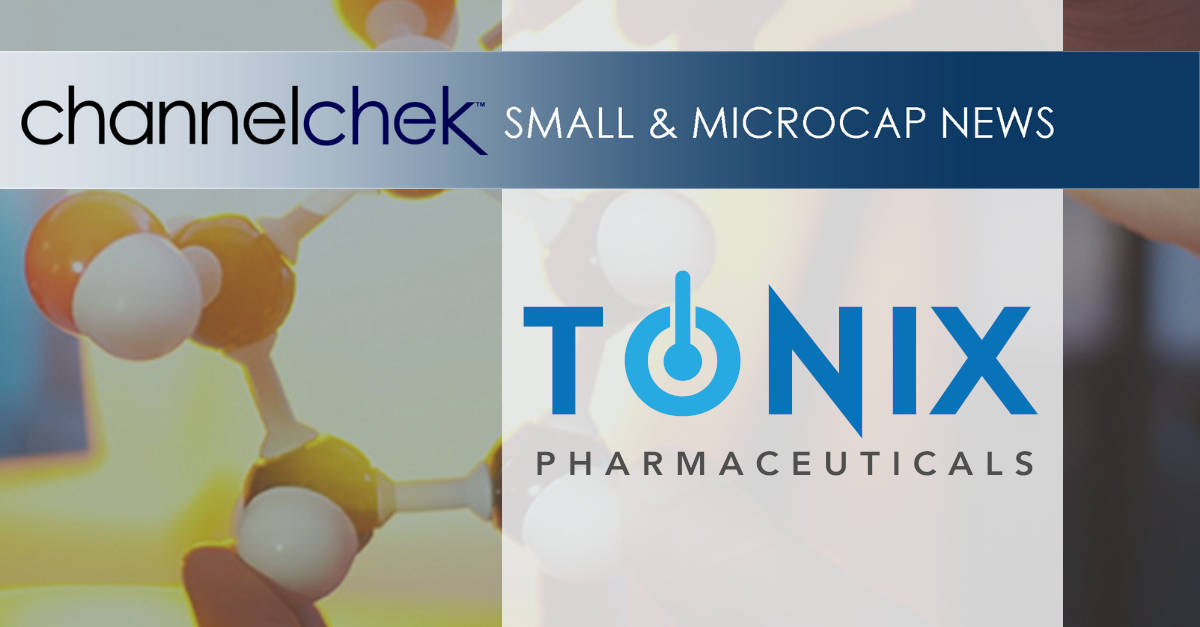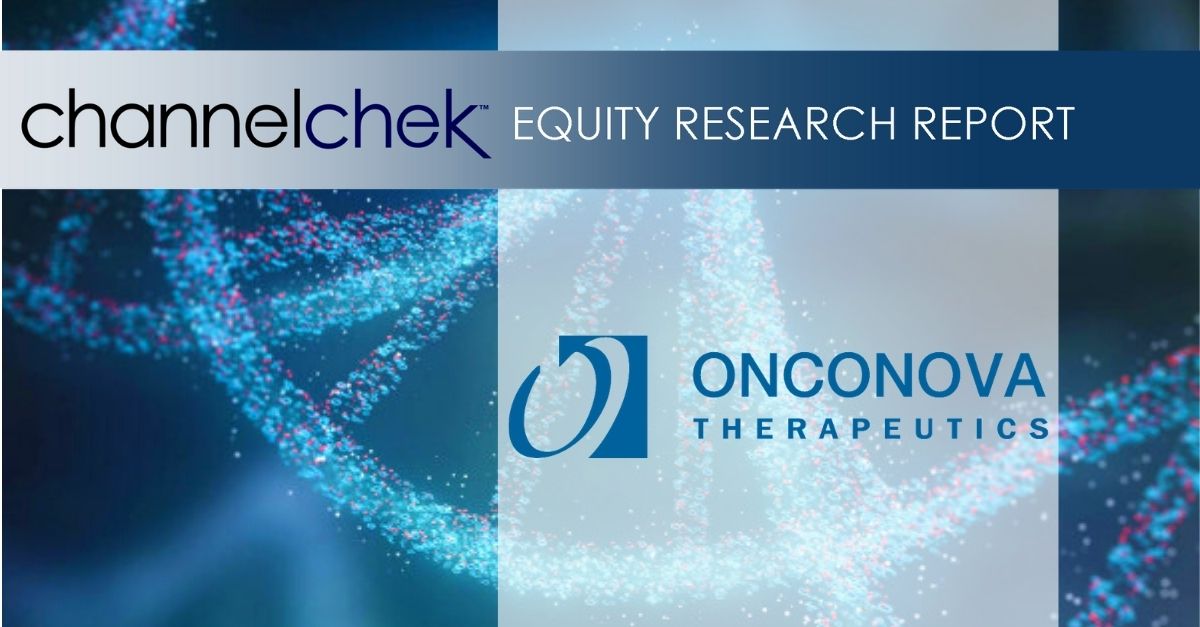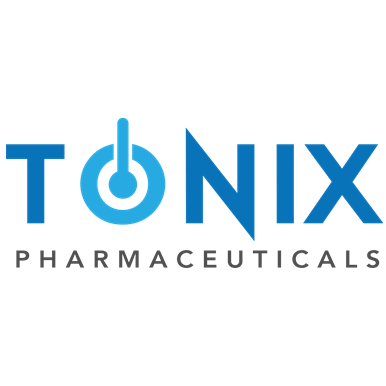
Research News and Market Data on TNXP
October 26, 2023 7:00am EDTDownload as PDF
Topline results expected early December 2023
Novel formulation of intranasal oxytocin contains magnesium (Mg2+), shown to potentiate the analgesic
effects of oxytocin on the oxytocin receptor in animal models
TNX-1900 blocks release of CGRP, a key peptide in the pathogenesis of migraine, from trigeminal ganglia
neurons while limiting systemic exposure
CHATHAM, N.J., Oct. 26, 2023 (GLOBE NEWSWIRE) — Tonix Pharmaceuticals Holding Corp. (Nasdaq: TNXP), a biopharmaceutical company with marketed products and a pipeline of development candidates, today announced the completion of the clinical phase of the Phase 2 proof-of-concept, double-blind, randomized, placebo-controlled PREVENTION1 study of TNX-19002 (intranasal potentiated oxytocin) as a potential treatment for the prevention of migraine headaches in chronic migraineurs. A total of 88 patients were enrolled in this multi-site study in the U.S. Topline results are expected in early December 2023.
TNX-1900 is a proprietary formulation of oxytocin that contains magnesium, which Tonix has shown in animal models potentiates the action of oxytocin at oxytocin receptors and potentially improves the consistency of treatment by reducing paradoxical high-dose inhibition. Its unique, multimodal mechanism of action includes an ability to inhibit the release of the trigeminal neuropeptide calcitonin gene-related peptide (CGRP) in blood vessels within the brain, its lining and the brainstem, and to suppress signaling in pain neurons. Tonix believes that by engaging and activating oxytocin receptors in the trigeminal ganglia, TNX-1900 has the potential to help those suffering from chronic migraine.
“TNX-1900 is being developed as a novel, non-CGRP antagonist approach to treatment for chronic migraineurs,” said Seth Lederman, M.D., Chief Executive Officer of Tonix Pharmaceuticals. “There are an estimated four million individuals in the U.S. suffering from this debilitating condition, and despite several classes of migraine preventives available, there remains an unmet need for novel approaches.”
“With the last patient now treated, we look forward to analysis of the results of this proof-of-concept study, which will help to inform our plans as we discuss next steps with the U.S. Food and Drug Administration (FDA),” said Gregory Sullivan, M.D., Chief Medical Officer of Tonix Pharmaceuticals. “We would like to thank the participants, their families, and all the investigators and researchers who have been an important part of this journey so far.”
1Clinical Trials.gov I.D. NCT05679908
2TNX-1900 is an investigational new drug and is not approved for any indication.
About the Phase 2 PREVENTION Study
The Phase 2 PREVENTION study is a double-blind, randomized, multicenter, placebo-controlled study to evaluate the efficacy and safety of TNX-1900 taken prophylactically on a daily basis to prevent chronic migraine. There are three arms: two treatment regimens of TNX-1900 and one placebo in a 1:1:1 ratio in a total of 88 participants across approximately 26 U.S. sites. After a four-week Run-In phase to confirm chronic migraine criteria are met, there are 12-weeks of a double-blind Treatment phase with study drug, followed by a 2-week safety Follow-Up phase. The primary efficacy endpoint is mean change in the number of migraine headache days between the 28-day Run-In phase and the last 28-days of the Treatment phase. Key secondary efficacy endpoints include proportion of patients experiencing a ≥ 50% reduction in the number of migraine headache days, mean change in the number of days using migraine abortive medications, and mean change in a migraine-specific quality of life measure.
For more information, see ClinicalTrials.gov Identifier: NCT05679908.
About Migraine
Migraine is a neurological condition that typically manifests in a throbbing moderate to severe headache which lasts at least four hours, often on one side of the head and aggravated by routine physical activity. It can also be accompanied by nausea, vomiting, visual disturbances, and sensitivity to bright light and loud noises1. Epidemiological studies indicate that globally, approximately 1.2 billion individuals suffer from migraines annually2. In the U.S., approximately 39 million Americans suffer from migraines and among these individuals, approximately four million experience chronic migraines (15 or more headache days per month, at least eight of which are migraines)2. The current FDA approved drugs for migraine prevention in chronic migraine include Botox® (onabotulinumtoxinA), and the anti-CGRP/CGRP-R monoclonal antibodies Aimovig® (erenumab), Vyepti® (eptinezumab), Ajovy® (fremanezumab) and Emgality® (galcanezumab).
1The International Classification of Headache Disorders, 3rd Edition. Cephalalgia. 2018. 38(1):1-211.
2Burch et al., Migraine: Epidemiology, Burden, and Comorbidity. Neurol Clin. 2019. 631–649.
About TNX-1900
TNX-1900 (intranasal potentiated oxytocin) is a proprietary formulation of oxytocin in development as a candidate for prevention in chronic migraine and other conditions. In 2020, TNX-1900 was acquired from Trigemina, Inc. who had licensed the technology underlying the composition and method from Stanford University. TNX-1900 is a drug-device combination product, based on an intranasal actuator device that delivers oxytocin into the nasal cavity. Oxytocin is a naturally occurring human peptide hormone that also acts as a neurotransmitter in the brain. Oxytocin has no recognized addiction potential. It has been observed that low oxytocin levels in the body are associated with increases in migraine headache frequency, and that increased oxytocin levels are associated with fewer migraine headaches. Certain other chronic pain conditions are also associated with decreased oxytocin levels. Migraine attacks are caused, in part, by the activity of pain-sensing trigeminal neurons which, when activated, release of calcitonin gene-related peptide (CGRP) which binds to receptors on other nerve cells and starts a cascade of events that is believed to result in headache. Oxytocin, when delivered via the nasal route, concentrates in the trigeminal system1 resulting in binding of oxytocin to receptors on neurons in the trigeminal system, inhibiting the release of CGRP and transmission of pain signals returning from the site of CGRP release2. Blocking CGRP release is a distinct mechanism compared with CGRP antagonist and anti-CGRP antibody drugs, which block the binding of CGRP to its receptor. With TNX-1900, the addition of magnesium to the oxytocin formulation enhances oxytocin receptor binding3 as well as its inhibitory effects on trigeminal neurons and resultant craniofacial analgesic effects, as demonstrated in animal models4. Intranasal oxytocin has been shown to be well tolerated in several clinical trials in both adults and children5. Targeted nasal delivery results in low systemic exposure and lower risk of non-nervous system, off-target effects, which could potentially occur with systemic CGRP antagonists such as anti-CGRP antibodies6. For example, CGRP has roles in dilating blood vessels in response to ischemia, including in the heart. The Company believes nasally targeted delivery of oxytocin could translate into selective blockade of CGRP release from neurons in the trigeminal ganglion and not throughout the body, which could be a potential safety advantage over systemic CGRP inhibition. In addition, daily dosing is more rapidly reversible, in contrast to monthly or quarterly dosing, as is the case with anti-CGRP antibodies, giving physicians and their patients greater control. In addition to chronic migraine, TNX-1900 will be developed for treatment of episodic migraine, binge eating disorder, craniofacial pain conditions, and insulin resistance. Tonix also has a license with the University of Geneva to use TNX-1900 for the treatment of insulin resistance and related conditions.
1Yeomans DC, et al. Transl Psychiatry. 2021. 11(1):388.
2Tzabazis A, et al. Cephalalgia. 2016. 36(10):943-50.
3Antoni FA and Chadio SE. Biochem J. 1989. 257(2):611-4.
4Cai Q, et al., Psychiatry Clin Neurosci. 2018. 72(3):140-151.
5Yeomans, DC et al. 2017. US patent US2017368095.
6MaassenVanDenBrink A, et al. Trends Pharmacol Sci. 2016. 37(9):779-788.
Tonix Pharmaceuticals Holding Corp.*
Tonix is a biopharmaceutical company focused on commercializing, developing, discovering and licensing therapeutics to treat and prevent human disease and alleviate suffering. Tonix Medicines, our commercial subsidiary, markets Zembrace® SymTouch® (sumatriptan injection) 3 mg and Tosymra® (sumatriptan nasal spray) 10 mg under a transition services agreement with Upsher-Smith Laboratories, LLC from whom the products were acquired on June 30, 2023. Zembrace SymTouch and Tosymra are each indicated for the treatment of acute migraine with or without aura in adults. Tonix’s development portfolio is composed of central nervous system (CNS), rare disease, immunology and infectious disease product candidates. Tonix’s CNS development portfolio includes both small molecules and biologics to treat pain, neurologic, psychiatric and addiction conditions. Tonix’s lead development CNS candidate, TNX-102 SL (cyclobenzaprine HCl sublingual tablet), is in mid-Phase 3 development for the management of fibromyalgia, having completed enrollment of a potentially confirmatory Phase 3 study in the third quarter of 2023, with topline data expected in late December 2023. TNX-102 SL is also being developed to treat fibromyalgia-type Long COVID, a chronic post-acute COVID-19 condition. Enrollment in a Phase 2 proof-of-concept study has been completed, and topline results were reported in the third quarter of 2023. TNX-601 ER (tianeptine hemioxalate extended-release tablets) is a once-daily oral formulation being developed as a treatment for major depressive disorder (MDD), that completed enrollment in a Phase 2 study in the third quarter of 2023, with topline results expected in early November of 2023. TNX-4300 (estianeptine) is a single isomer version of TNX-601, a small molecule oral therapeutic in preclinical development to treat MDD, Alzheimer’s disease and Parkinson’s disease. Relative to tianeptine, estianeptine lacks activity on the mu-opioid receptor while maintaining activity and the ability to activate PPAR-β/δ and neuroplasticity in tissue culture. TNX-1900 (intranasal potentiated oxytocin), is in development as a preventive treatment in chronic migraine, and the clinical phase of a Phase 2 proof-of-concept study is now completed with topline data expected in early December 2023. TNX-1900 is also being studied in binge eating disorder, pediatric obesity and social anxiety disorder by academic collaborators under investigator-initiated INDs. TNX-1300 (cocaine esterase) is a biologic designed to treat cocaine intoxication and has been granted Breakthrough Therapy designation by the FDA. A Phase 2 study of TNX-1300 is expected to be initiated in the fourth quarter of 2023. Tonix’s rare disease development portfolio includes TNX-2900 (intranasal potentiated oxytocin) for the treatment of Prader-Willi syndrome. TNX-2900 has been granted Orphan Drug designation by the FDA. Tonix’s immunology development portfolio includes biologics to address organ transplant rejection, autoimmunity and cancer, including TNX-1500, which is a humanized monoclonal antibody targeting CD40-ligand (CD40L or CD154) being developed for the prevention of allograft rejection and for the treatment of autoimmune diseases. A Phase 1 study of TNX-1500 was initiated in the third quarter of 2023. Tonix’s infectious disease pipeline includes TNX-801, a vaccine in development to prevent smallpox and mpox. TNX-801 also serves as the live virus vaccine platform or recombinant pox vaccine platform for other infectious diseases, including TNX-1800, in development as a vaccine to protect against COVID-19. The infectious disease development portfolio also includes TNX-3900 and TNX-4000, which are classes of broad-spectrum small molecule oral antivirals.
*Tonix’s product development candidates are investigational new drugs or biologics and have not been approved for any indication.
Zembrace SymTouch and Tosymra are registered trademarks of Tonix Medicines. Intravail is a registered trademark of Aegis Therapeutics, LLC, a wholly owned subsidiary of Neurelis, Inc. All other marks are property of their respective owners.
This press release and further information about Tonix can be found at www.tonixpharma.com.
Forward-Looking Statements
Certain statements in this press release are forward-looking within the meaning of the Private Securities Litigation Reform Act of 1995. These statements may be identified by the use of forward-looking words such as “anticipate,” “believe,” “forecast,” “estimate,” “expect,” and “intend,” among others. These forward-looking statements are based on Tonix’s current expectations and actual results could differ materially. There are a number of factors that could cause actual events to differ materially from those indicated by such forward-looking statements. These factors include, but are not limited to, risks related to the failure to obtain FDA clearances or approvals and noncompliance with FDA regulations; risks related to the failure to successfully market any of our products; risks related to the timing and progress of clinical development of our product candidates; our need for additional financing; uncertainties of patent protection and litigation; uncertainties of government or third party payor reimbursement; limited research and development efforts and dependence upon third parties; and substantial competition. As with any pharmaceutical under development, there are significant risks in the development, regulatory approval and commercialization of new products. Tonix does not undertake an obligation to update or revise any forward-looking statement. Investors should read the risk factors set forth in the Annual Report on Form 10-K for the year ended December 31, 2022, as filed with the Securities and Exchange Commission (the “SEC”) on March 13, 2023, and periodic reports filed with the SEC on or after the date thereof. All of Tonix’s forward-looking statements are expressly qualified by all such risk factors and other cautionary statements. The information set forth herein speaks only as of the date thereof.
Investor Contact
Jessica Morris
Tonix Pharmaceuticals
investor.relations@tonixpharma.com
(862) 904-8182
Peter Vozzo
ICR Westwicke
peter.vozzo@westwicke.com
(443) 213-0505
Media Contact
Ben Shannon
ICR Westwicke
ben.shannon@westwicke.com
443-213-0495
Source: Tonix Pharmaceuticals Holding Corp.
Released October 26, 2023
